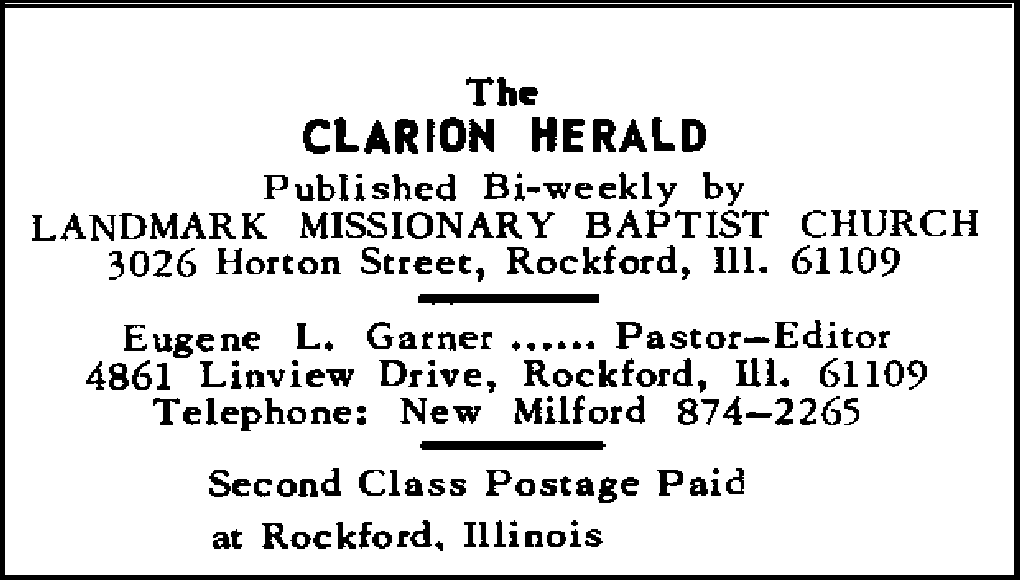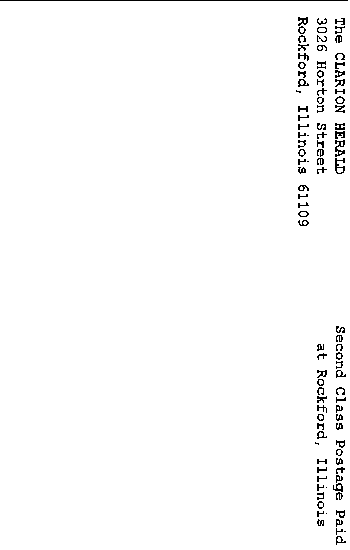
|
 |
 |
 |
|
 
|
|
|
BEATITUDES OF THE REVELATION
Scattered throughout the book of Revelation are found seven beatitudes -- designed to exhort and encourage the hearts of the saints in the midst of various trying circumstances.
1. The first declares "blessed" "he that readeth, and they that hear the words of this prophecy, and keep those things that are written therein", (1:3).
2. When it appears that evil is about to triumph in the earth a voice is heard from heaven saying: "Blessed are the dead who die in the Lord from henceforth", (14:13).
3. In a setting of overflowing wickedness and demonic influences, there is heard another word of encouragement: "Blessed is he that watcheth, and keepeth his garments; lest he walk naked, and they see his shame", (16:15).
4. Following the overthrow of the harlot-woman who exalted herself to abuse the saints, it is written: "Blessed are they which are called to the marriage supper of the Lamb", (19:9).
5. The pangs of suffering and death are lightened by the prospect of resurrection and participation with the glorious Son of God in His
|
|
|
|
reign on the earth: "Blessed and holy is he that hath part in the first resurrection: on such the second death hath no power, but they shall be priests of God and of Christ, and shall reign with him a thousand years", (20:6).
6. While the first beatitude was directed to the plurality of saints in the churches, the sixth is an appeal to the individual hearer: "Blessed is he that keepeth the words of the prophecy of this book" (22:7).
7. Finally, there is the prospect of entrance and participation in the glories of the "holy city" -- a blessing reserved for such as walk in covenant-fellowship with their divine Lord: "Blessed are they that DO his commandments (or wash their robes), that they may have right to the tree of life, and may enter in through the gates into the city", (22:17).
Such words of hope encourage holiness. They are an antidote against both fear and slothfulness -- focusing the attention of believing hearts upon the abundant provision the faithful Lord has made for our eternal future.
BLESSED INDEED are they who make the Lord their trust! No good thing does He everwithhold. E.G.
|
|
|
|
|
Page - 2
"IF IT WERE NOT SO"..... "
In speaking to the heart of His "little flock", Jesus said "In my Fathers house are many mansions: if it mere not so, I WOULD HAVE TOLD YOU", (Jn. 14:2). His dealings were ever faithful and true. Never did He lend His voice, influence or approval to the perpetuation of falsehood, half-truths or misconceptions of divine revelation.
"Have ye not read"? was Jesus' inquiry of the Pharisees on various occasions, (Matt. l2:3 l9:4). And when the Sadducees raised a foolish question regarding the resurrection He said: "Ye do ERR, not knowing the Scriptures, nor the power of God", (Matt. 22:29). It would be an interesting and profitable study to take a trip through the Gospel records for the sole purpose of discovering the many ways wherein our Lord corrected false religious concepts in His day. In this, as in all other matters, He surely set
|
|
|
|
an example for such as would walk in His steps.
It is indeed a strange sort of mentality that imagines the possibility of a false concept's suddenly becoming a true concept -- worthy of perpetuation -- through long usage. And it is a questionable spirituality that can ridicule as "new light" (or some similar contemptuous phrase) the faithful attempt of any brother to rescue biblical concepts (and/or terminology) from abuses imposed by a perverted usage.
A comparison of scripture with scripture is the only safe method of determining biblical usage. One thing for which all scripture is said to be "profitable" is "for CORRECTION" -- involving "restoration to an upright or right state".
Many are the biblical concepts and terms that have been so abused that those who wrote them would be horrified. There are many areas where CORRECTION is needed. Thank God for those few brave souls who would rather use biblical terms biblically than attempt to appease the fearful (who are constantly being ensnared by other men's opinions) by the Romish practice of the "sacrifice of the intellect".
To avoid a biblical usage of biblical terms -- for fear of alienating such as have been accustomed to use it erroneously -- is to manifest both moral weakness and intellectual dishonesty. Why not learn to proclaim God's message in all its purity and consistent beauty -- trusting Him to open hearts to receive and appropriate it in faith? Just let God BE GOD! E.G.
|
|
|
|
|
"TIMOTHY, MY OWN SON"
It is obvious that Timothy was NOT Paul's son in a physical sense; his father was a Greek (Acts 16:3). But in the realm of faith (and certainly in the Christian ministry) there had developed between them an affection and mutuality of relation-ship that is best illustrated by the father-son relationship at its loving best. It was such a relationship as enriched the lives of both.
In Timothy Paul found a mind like his own and a faithful companion who was willing to submit himself under the authority of the elder. In the apostle Timothy found a faithful teacher, guide and example -- by whose life his own would be enriched a thousand-fold. Under the apostle's faithful instruction Timothy would be so rooted and grounded in spiritual insight; he would develop such spiritual convictions as would enable Paul to entrust him with many delicate tasks that were necessary for the continuing development of the churches in various places.
It appears that Timothy was saved on the occasion of Paul's first visit to Lystra -- where he was stoned and left for dead, (Acts l4 19-20). He was at least familiar with this event, (2 Tim. 3:10-11). He was aware of Paul's faith; that faith made a deep impression on his young heart. The brethren in his home church recognized the hand of God upon Timothy. He had borne a faithful witness in Lystra and Iconium.
When Paul returned to Lystra he
|
|
|
|
Page - 3
desired that Timothy should accompany him (Acts 16:3). It was doubtless with mixed emotions that his godly mother and grandmother heard him agree to accompany the apostle, (2 Tim. 1:4; 3:14-15). But their hearts must have rejoiced at every report of his faithfulness to the God whom they loved so dearly.
Lest Timothy, being part Jew, should be an offence to Jewish consciences, Paul circumcised him before permitting him to go. Whether this was proper is NOT a matter for 20th century Christians to settle. It appeared proper to the apostle and was surely in harmony with the guiding principles of his ministry, (I Cor. 6:12; 10:23; 9:20).
Scanning the latter chapters of Acts, and the epistles of Paul, it is evident that Timothy was a faithful companion and servant of the holy apostle. He accompanied Paul to Philippi, (Acts 16:6-12) and assisted in the work at Thessalonica, (Acts 17:1-9; I Thes. 1:1). Paul left him with Titus at Berea in an effort to strengthen that church. They later joined Paul at Athens. Soon thereafter Timothy was sent to Thessalonica (I Thes. 3:1-8), later rejoining Paul at Corinth (Acts 10:5).
On Paul's third missionary tour Timothy is seen with him at Ephesus (Acts 19:22). But Paul sent him to Macedonia (I Cor. 16:10-11), with the intention that he should go on to Corinth, (I Cor. 4:17). But he was still in Macedonia, when Paul wrote his Second Corinthian letter (2 Cor. 1:1). He later accompanied Paul to Corinth (Rom. 16:21). And
|
|
|
|
|
Page-4
he continued with Paul on his return so far as Troas, (Acts 20:5).
Our next glimpse of Paul's "son" is with the aged apostle at Rome -- during his first imprisonment there (Phil. 1:1; Col. 1:1); but Paul is about to send him on a mission to his beloved Philippi (Phil. 2:19-24). After the apostle's release from Rome, he gave Timothy charge over the church at Ephesus, (I Tim. 1:3). Finally, Paul summoned him to come to Rome "speedily" -- during his second imprisonment there, (2 Tim. 4:9-21). From Hebrews 13:23 it appears that Timothy was at one time imprisoned with Paul.
|
|
|
|
The relationship existing between Paul and Timothy was an enrichment to both of their lives -- a combination that brought glory to God and blessing to successive generations.
Paul was faithful in passing the torch to a succeeding generation. So, in his final letter to his dear "son", he urged that Timothy should do likewise: "Thou therefore, my son, be strong in the grace that is in Christ Jesus. And the things that thou hast heard of me among many witnesses, the same COMMIT THOU to faithful men, who shall be able to teach others also", (2 Tim. 2:1-2).
No pastor can more profitably invest his time than in the encouragement and instruction of young men whose hearts have been divinely touched -- whose deepest yearning is after such purity and spiritual understanding as will enable them to be effective witnesses to the glory of their wonderful Lord.
As a pastor, brother and friend of young men who desire to serve my Lord, I thank God for those He has given me to love and encourage in the way of truth. And I constantly desire such grace and wisdom as can only come from above -- such as will enable me to BE A BLESSING rather than a hindrance. AMEN! E.G.
*************
Jesus once said to His little flock "The harvest truly is plenteous, but the laborers are few; Pray ye therefore the Lord of the harvest, that he will send forth laborers into his harvest", (Matt. 9:38).
In view of abounding iniquity and perishing souls, LET US SO PRAY!!
|
|
|
|
|
 |
 |
 |
|




